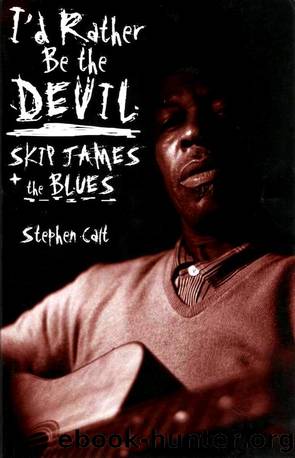Iâd Rather Be the Devil by Stephen Calt

Author:Stephen Calt [Calt, Stephen]
Language: eng
Format: epub
Publisher: Da Capo Press
Published: 1994-09-15T00:00:00+00:00
To James, and other Baptists, these âsanctsâ (as he called members of the sanctified sects) were getting away with something. âThey pretend to live above those things, and not to be tempted. But theyâll lie,â he said of them. âYes, they do. Yeah, âcause when Iâve tried it out on them, I know some of them very sancts that was dancinâ by that sanctified music come and danced by some of my blues music.â
Abstractly, he bore the typical Baptist view of mankind as a sin-blackened creature. âYou born in sin and shaped in iniquity,â he said. The idea that one could live âabove sinâ struck him as the ultimate blasphemy. âIf youâre livinâ free from sin and above sin, what you got to ask God for? Huh?â he asked in later years. âYou donât need His assistance, because you gonna be equalized with Him.â
Jamesâ view of sin was equally extreme as that of Holiness members, but ran in the opposite direction: sin was not only inescapable, but omnipresent. âOnliest way that youâll live free from sin is when youâre ready to leave here,â he said. âFor the few moments or seconds that youâre leavinâ here, you may be free from sin, because your mind ainât on nothinâ else. Nothinâ can contaminate you or confuse your mind . . .â
Yet for all of his hypothetical saturation in sin, James did not have the slightest understanding of what sin amounted to, in conventional Christian terms. The reason sin so readily contaminated people, he reasoned, was because it was imposed from without. âYou canât think righteousness always because of the environments around; the atmosphere is poison with sin. And itâs impossible for a person to live holy and righteous in this sinful world.â This conclusion, no doubt, presented him with a ready rationalization to do much as he pleased in life, while maintaining his own piety.
It is tempting to view Jamesâ lurid view of sin as a reflection of his own lowly image of himself compared to his lofty father. âThe best you can do,â he would maintain, âis filthy rags in the sight of the Lord.â But despite this self-abasement, his own Biblical outlook bore a curious underlying resemblance to that of the âsanct.â He had very little contrition, or even humility. In the 1960s he persistently regarded himself as a Godly person when, by the standards of his Baptist faith, he had no religious qualifications whatsoever, and never even attended church. It was no accident that his wife would be a âsanctâ who was more tolerant of him than any Baptist mate would have been, though she did not share his claim to be âone of the best men who ever walked.â
Download
This site does not store any files on its server. We only index and link to content provided by other sites. Please contact the content providers to delete copyright contents if any and email us, we'll remove relevant links or contents immediately.
The Goal (Off-Campus #4) by Elle Kennedy(12465)
Kathy Andrews Collection by Kathy Andrews(10572)
Diary of a Player by Brad Paisley(6872)
What Does This Button Do? by Bruce Dickinson(5540)
Assassin’s Fate by Robin Hobb(5263)
Big Little Lies by Liane Moriarty(4897)
Pale Blue Dot by Carl Sagan(4027)
Sticky Fingers by Joe Hagan(3462)
The Heroin Diaries by Nikki Sixx(2945)
The Death of the Heart by Elizabeth Bowen(2916)
Beneath These Shadows by Meghan March(2732)
The Help by Kathryn Stockett(2712)
Confessions of a Video Vixen by Karrine Steffans(2686)
How Music Works by David Byrne(2545)
Jam by Jam (epub)(2500)
Harry Potter 4 - Harry Potter and The Goblet of Fire by J.K.Rowling(2423)
Strange Fascination: David Bowie: The Definitive Story by David Buckley(2374)
Petty: The Biography by Warren Zanes(2244)
Darker Than the Deepest Sea by Trevor Dann(2219)
